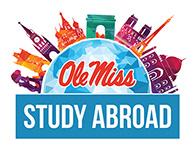Announcements : Studying Abroad During A Pandemic
Announcement: Studying Abroad During A Pandemic
Read the full announcement about our location-based analyses.
We believe the best approach to assessing and managing risk in the current environment is a holistic one. UM Study Abroad does not use one single source of information as a sole tripwire for determining whether to approve, run, or continue to run a program. Instead, we will continue to be informed by an analysis of all relevant data and information and will utilize that overall analysis to make decisions.Based on a holistic approach, partner guidance, and data gathered from a variety of sources, we are proceeding with study abroad programs at the University of Mississippi. If there is a significant increase in risk in a particular location, we will reevaluate and make changes if necessary, just like we would pre-pandemic.
We have identified the following factors as important aspects impacting both UM and individual students. These include:
- The ability for free movement and reliable flights in and out of the host country
- Rate of community transmission of COVID-19 and testing in the location
- Local governmental restrictions and implications for student experience in-country
- Availability of routine and emergency healthcare services
- Governmental and non-governmental advisories and resources
The Importance of Vaccinations and Boosters
The University of Mississippi has not mandated COVID-19 vaccination for students. However, due to the COVID-19 pandemic, other countries, educational partners, travel providers, and others involved in aspects of study abroad may require confirmation or documentation of COVID-19 vaccination. In fact, most study abroad programs require participants to show proof of being fully vaccinated against COVID-19.
As a result, it may be necessary to demonstrate full vaccination against COVID-19 to enter a country or access various sites and services during a study abroad program. It is the student's responsibility to research and know the vaccination and testing requirements of their destination(s). In the current environment, country entry requirements continue to change quickly and sometimes without notice.
UM strongly recommends COVID-19 vaccination for all individuals traveling abroad. If a student is not permitted to enter the host country or fully participate in the program due to failure to comply with COVID-19 vaccination, testing, or documentation requirements, any resultant costs or academic consequences will be the student's sole responsibility. By participating in a study abroad program, students understand that the host countries, airlines, providers, institutions, buildings and physical spaces, experiences, housing, or any other location or service may require proof of vaccination status at any time, and the student agrees to provide such COVID-19 vaccination documentation if requested.
Booster Shots Highly Encouraged
If it has been more than six months since their single dose of Johnson and Johnson vaccine or their second dose of the Pfizer or Moderna vaccine, the UM Study Abroad Office recommends getting a booster prior to departure. Students should not rely on being able to get booster shots abroad as this is far from certain in most cases.
Even before Omicron, many study abroad programs required all study abroad participants to be fully vaccinated to minimize the health risk to participants, staff, and our worldwide communities. And a booster shot has become a requirement in Italy and France for a valid health pass, which is needed to enter restaurants, cafes, and museums, and other public venues. Other countries are likely to follow suit; the European Union has proposed that all vaccine certificates, including the CDC or other similar vaccination document from the United States, have a maximum validity of 270 days.
This means that a U.S. student who was vaccinated more than 270 days ago would no longer be considered as being in possession of a valid vaccination certificate and would be subject to the same restrictions as an unvaccinated individual. In many cases, these restrictions on access to hospitality, leisure, culture, sports, and other venues, would impede a student’s ability to participate in their study abroad program.
